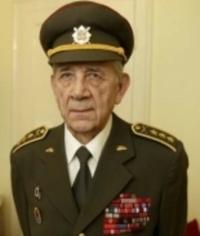“I entered a house where there stood a woman at the window. I greeted her but she gave me absolutely no reply. She kept gazing at the garden – there laid her brother-in-law with her son shot dead.”

Download image
Antonín Popovič was born in the village of Zolotarevo in Carpathian Ruthenia in 1924. Due to the very weak social situation of his family, he left school after six years of primary school at the age of 12. Then he worked as a helper on a farm. He crossed the border from the USSR in May 1941. He was arrested and sentenced to three years for illegal border crossing. In the camp in the Arkhangelsk region he took part in building a railway. He was rehabilitated and dismissed in December 1942. He failed at recruitment due to his poor health condition and was placed in the sugar factory in the Kazakh town Dzhambul. He left for Buzuluk in August 1943 and he joined the Czechoslovak troops. He took part in the battle of Kiev and then transferred back to Buzuluk. He was then placed in the guard of honor designated for welcoming president Beneš. He didn’t finish his training in the 2nd Paratroopers Brigade because of his injury in January 1944. Afterwards, he studied at an Armoured School in Saratova during spring and summer 1944. After his graduation he with the III Tank Battalion of the II Tank Division took part in the operation at Dukla Pass, at Jaslo and in liberating of a part of Poland and North Moravia. He remained in the Army after the war and worked in various military stations and schools. He lives with his wife in Slaný to this day.
